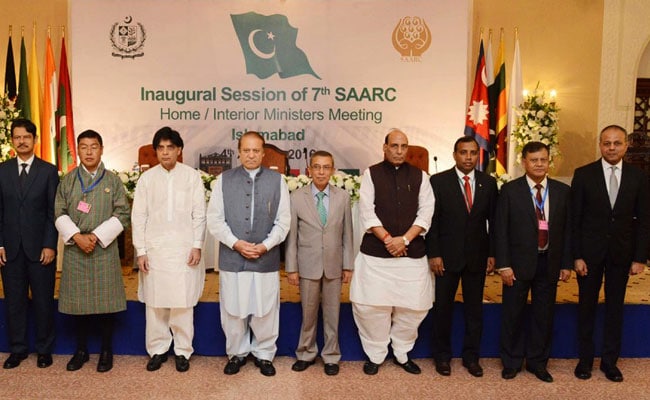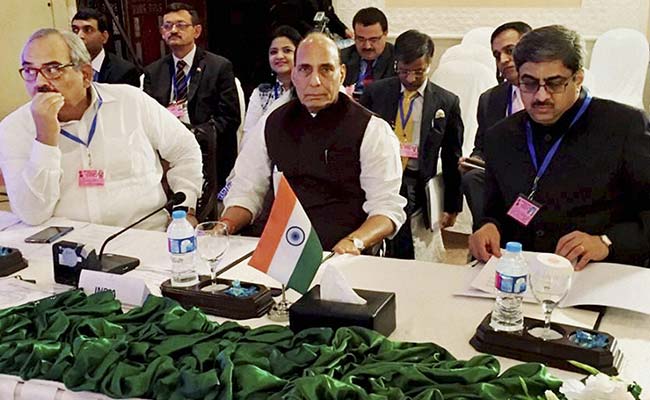He had no constructive aims. He only wanted to show naive and impressionable Indian saffronites that he had the chutzpah to tick off the Pakistanis on their own soil. That may have won him some brownie points at home, but no one else was impressed. Certainly, the joint conclusions drafted at the end of the meeting made no mention of the pyrotechnics of either India or Pakistan. While the two principals were going for each other's throats, the SAARC ministers got no further than reiterating that earlier decisions relating to SAARC cooperation on terrorism needed to be acted on. It was clear that the six other SAARC partners were keen only to not be seen taking sides in the India-Pak tu-tu-mein-mein. They had all heard it before.
What has been little reported or not reported at all in the Indian media is Pakistan Interior Minister, Chaudhury Nisar Ali Khan's riposte to Rajnath Singh. Dawn, on the other hand, reported our Home Minister's stinging remarks, "Terrorists should not be glorified as 'martyrs'. There is no good or bad terrorism. Terrorism is terrorism." What is really unfortunate for us, however, is that same news item also reported what Nisar Ali Khan had said in response: "violence against freedom fighters in a disputed territory under Indian occupation is state-sponsored". Did we really want our partners in SAARC to hear such language directed at us? Or while we mutter that "talks and terrorism cannot go together", do we really want to hear the Pakistani Interior Minister telling SAARC and the whole world that "Pakistan is ready to engage in any dialogue process based on mutual respect and dignity with no strings attached"? Dawn told its readers that Rajnath Singh stormed out of the meeting "after losing a war of words with his Pakistani counterpart". We may argue till Kingdom Come who won and who lost this "war of words" but certainly no higher diplomatic purpose is served in letting the Pakistanis get away with the last word.
We certainly have not been seen by the United States as coming out the victor. While ritually asking Pakistan to "act against groups targeting neighbours", while Rajnath Singh demands to know how we can cooperate against terrorism with a state that itself sponsors such terrorism, the US State Department's deputy spokesman, Mark Toner, availed himself of the opportunity provided by the spat to restore the hyphenated US view of India and Pakistan. Said Toner, "We advocate for closer cooperation, certainly, between India and Pakistan to deal with the terrorist threat in both countries". If that isn't one in the eye for India, I would like to know what is. Rajnath's position has been repudiated and Nisar Ali's view has been reflected in the US State Department's reaction to the SAARC Home Ministers' meeting. Toner went on to make things even more explicit: "Terrorism is obviously a reality in both countries, and in order to effectively confront it, they need to work together." We say we can't work with a terrorism-complicit Pakistan government; Pakistan says there is no alternative to India and Pakistan working together to control terrorism; and the US State department, mixing up who is its "Major Defence Partner" in South Asia, not only wants India to follow the Pakistan line, it endorses Nawaz Sharif's boast, saying, "We believe that Pakistan has taken and is taking steps to counter terrorist violence." The spokesman then moderates that compliment by adding that these steps are "certainly focusing on those groups that threaten Pakistani or Pakistan's stability." He reiterates that $300 million in aid to Pakistan has been put on hold because the US is not satisfied that adequate attention is being paid to action against the Haqqani network, but confirms that no such aid suspension is contemplated for Pakistani non-action against groups "focusing" on India. Does this amount to "US endorses India's anti-terror stand" as more than one Indian media headline claims?

Pak Prime Minister Nawaz Sharif and Home Minister Rajnath Singh with delegates after the inauguration of the SAARC Home Ministers' conference (AFP photo)
This report by one of India's better known friends in the Pakistan media stressed that both the Pakistan army and the government were concerned for the stability of the Nawaz Sharif regime if serious trouble were to break out as a result of protests during Rajnath Singh's visit. He quotes a well-known independent Pakistani analyst, Ali Zaidi, as saying "if the religious parties had started a public agitation which resulted in violence and deaths, the situation would have turned precarious for the government. At such a time, the arrival of the Indian home minister, who is seen as one of the players behind the violence (in Kashmir), is hard to justify". Another Pakistani journalist, Tahir Najmi, adds an explanatory note: "That is why we saw the blacking out of coverage of the event on national channels as well as downplaying on most media."
Surely, all this was conveyed by our High Commissioner in Islamabad to the Modi government before the latter decided to send Rajnath on a fruitless trip to Pakistan. Our views about Pakistani-sponsored terrorism were well-known. We did not need yet another platform to repeat what we have been saying for years. Why then send so senior a minister as our Home Minister, effectively Number 2 in our government, to indulge in grandstanding in Islamabad if his speech was going to be downplayed, indeed, not made public at all as per SAARC conventions and past practice? That could have been left to Rajnath's affable and able deputy, Kiren Rijiju, especially as no bilateral meetings with the Pakistanis were scheduled on the sidelines. After all, only Bhutan and Sri Lanka were represented at Home/Interior minister level; Afghanistan and Maldives sent their deputy ministers. Bangladesh sent their Home Secretary. And Nepal was represented by their Ambassador.

Home Minister Rajnath Singh with the Indian delegation attending the first working session of SAARC 2016 Home Ministers' Conference in Islamabad last week (PTI photo)
Ever since Simla 1972, we have rejected any role for the UN in Kashmir. The UN has been only too pleased to wash its hands of the whole affair. So, the Home Minister's thunder could not have been addressed to the international community. His words were not heard at all in Pakistan. The other SAARC ministers were just not interested and, in any case, could do nothing about it. The US, as shown above, barely backed us. So, what national purpose has been served by Rajnath Singh personally performing to a non-audience in Islamabad?
It was not always like this. When P Chidambaram as Home Minister went to Islamabad in 2010, he was given a ceremonial welcome. His main purpose, publicly stated, was to present definitive evidence on Pakistan's involvement in the Mumbai 26/11 terrorist outrage. Stone-throwing had resumed in the Valley. Tension was in the air. And yet, there was enough respect for the Indian Home Minister for Chidambaram to receive a welcome fit for a Home Minister. This time insults were exchanged, courtesies were given the go-by, nothing was achieved at either SAARC or bilaterally with Pakistan. Was it for this that Rajnath Singh took his "Plane to Pakistan"?
(Mani Shankar Aiyar is former Congress MP, Lok Sabha and Rajya Sabha.)
Disclaimer: The opinions expressed within this article are the personal opinions of the author. The facts and opinions appearing in the article do not reflect the views of NDTV and NDTV does not assume any responsibility or liability for the same.


